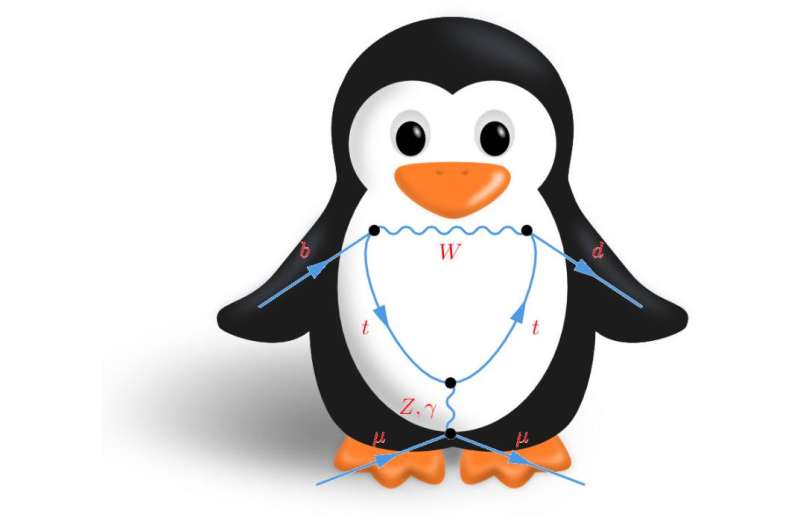Artist's rendering of a rare B-meson "penguin" (decay process) showing the quark-level process. Credit: Daping Du, Syracuse University
(Phys.org)—It was another good week for physics as a combined team of researchers with Fermilab Lattice and MILC Collaborations made public a newly developed high-precision calculation they came up with that holds promise for significantly advancing the hunt for physics that lie past the standard model. The reckoning applies to a certain decay of a B meson, sometimes referred to as the "penguin decay" process. And speaking of mesons, another team at TU Wien in Austria, revealed that they had found evidence of a particle purely made of nuclear force—their calculations suggested meson f0(1710) could be the glueball, that many in the field have been looking for. And another team with the Hebrew University of Jerusalem asked: What is quantum in quantum thermodynamics?
In other news, signs of the impact of technological innovation on us humans was evidenced by a team at MIT that came up with a system that replaces human intuition with algorithms that outperform human teams –all part of advances in big-data crunching, and by another team of engineers at Stanford who announced that they had created an artificial skin that can send pressure sensation to brain cell. Also a team at the University of Aberdeen in the U.K found evidence that suggests living in 'eternal summer' may be adversely impacting our health—indoor lighting and heating may be preventing natural regulatory systems that protect us, from kicking in when seasons change.
There was also more dire news regarding global warming—a trio of researches with Princeton University in the U.S. and the Potsdam Institute in Germany announced that they had evidence that showed that we have passed a tipping point, no matter what we do sea level rise will swallow Miami, New Orleans, and other cities. Meanwhile another global marine analysis suggests a food chain collapse—in the world's oceans. A team with the University of Adelaide claimed their evidence shows that ocean acidification in response to rising CO2 emissions is likely to lead to a major reduction in the numbers of marine species and overall diversity. Not related but still sad, a team of researchers at Children's Research Institute at UT Southwestern announced that their study showed that antioxidant use may promote the spread of cancer.
And finally, if you have been stressing about reports of health problems related to sitting down while you work all day, a team of researchers with the U.K.'s Exeter University and University College London found that sitting is no worse for health than standing—as long as you exercise regularly.
© 2015 Phys.org
























